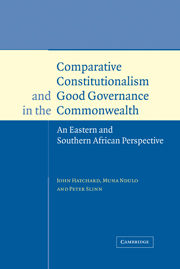 Comparative Constitutionalism and Good Governance in the Commonwealth
Comparative Constitutionalism and Good Governance in the Commonwealth Book contents
- Frontmatter
- Contents
- Preface
- List of cases
- List of constitutions
- List of statutes
- List of other instruments
- Map
- Introduction
- 1 The democratic state in Africa: setting the scene
- 2 Constitutions and the search for a viable political order
- 3 Devising popular and durable national constitutions: the new constitutions of the 1990s
- 4 Perfecting imperfections: amending a constitution
- 5 Presidentialism and restraints upon executive power
- 6 Enhancing access to the political system
- 7 Making legislatures effective
- 8 The judiciary and the protection of constitutional rights
- 9 The devolution of power to local communities
- 10 Developing autochthonous oversight bodies: human rights commissions and offices of the ombudsman
- 11 Seeking constitutional control of the military
- 12 Constitutionalism and emergency powers
- 13 Constitutional governance: the lessons from southern and eastern experience
- Bibliography
- Index
6 - Enhancing access to the political system
Published online by Cambridge University Press: 23 June 2009
- Frontmatter
- Contents
- Preface
- List of cases
- List of constitutions
- List of statutes
- List of other instruments
- Map
- Introduction
- 1 The democratic state in Africa: setting the scene
- 2 Constitutions and the search for a viable political order
- 3 Devising popular and durable national constitutions: the new constitutions of the 1990s
- 4 Perfecting imperfections: amending a constitution
- 5 Presidentialism and restraints upon executive power
- 6 Enhancing access to the political system
- 7 Making legislatures effective
- 8 The judiciary and the protection of constitutional rights
- 9 The devolution of power to local communities
- 10 Developing autochthonous oversight bodies: human rights commissions and offices of the ombudsman
- 11 Seeking constitutional control of the military
- 12 Constitutionalism and emergency powers
- 13 Constitutional governance: the lessons from southern and eastern experience
- Bibliography
- Index
Summary
Introduction
Access to the political system is an integral part of good governance and is fast becoming a normative rule of the international system. Increasingly, governments now have to recognise that their legitimacy depends on meeting the international community's expectations and that those seeking validation of the empowerment process must patently govern with the consent of the governed. ‘Access’ in this context raises several constitutional issues. These include, firstly, freedom to organise political parties and generally to participate in the political process, including ensuring fair access for women and minorities; secondly, freedom of political expression and the right to campaign free from intimidation or other undue influences; and thirdly, the right of the adult population to vote and to elect or re-elect governments at regular intervals in free and fair elections. It is on such issues that this chapter and the next focus attention.
Political parties and democratic governance
Political parties, defined as distinctive organisations whose principal aim is to acquire and exercise political power, are the dominant feature of contemporary organised political systems.
- Type
- Chapter
- Information
- Comparative Constitutionalism and Good Governance in the CommonwealthAn Eastern and Southern African Perspective, pp. 99 - 122Publisher: Cambridge University PressPrint publication year: 2004


